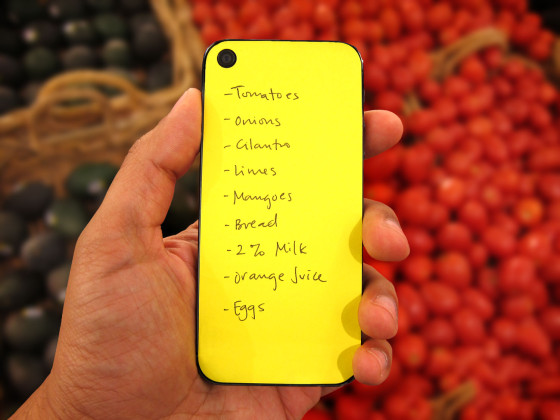
On my last trip overseas I decided to print out my boarding pass. I know, there are lots of ways to board digitally. I can show my QR-Code boarding pass thingy and scan it myself at the counter. But the last two times I tried that it was just such a stressful and annoying experience I decided to go back to paper.
Now don’t get me wrong, I’m not a luddite who thinks that technology and innovation sucks. I love my iPhone and iPad and I own a scanner that digitizes everything than isn’t digital as soon as it enters my house and keeps everything available everywhere and over all my devices.
There are just moments when paper is still superior to digital, in at least these five categories:
- Boarding passes
- Taking notes in meetings
- Sticky notes
- Magazines
- Business cards
Lets start with boarding passes. A few months ago I had to travel to Geneva and back. I had a long day, it was warm, I was late and I was trying to get to my airplane as fast as possible. I had the email with the QR-Code ready, my coat hanging over my left arm, moving closer to the person checking all the tickets. I was sweating and annoyed and tired. When I came to the front of the line I held up my iPhone and showed the screen to the women checking the tickets. She looked at the screen, then at me, and shrugged. I understood something was wrong and looked at my iPhone. It showed my email inbox. Damn.
Apparently, I had touched the screen while fiddling with my luggage and coat and had moved the email. But where? I have 4 different email accounts, and I could have either hit the delete button or the move button. It could be in any number of places, and now I had to enable my data connection, and go through about 16 folders looking for the missing email. I found it but it took me a few minutes and by now I was even more annoyed, and sweating.
 Let’s move to taking notes in meetings. As I mentioned before, I love Evernote and often I will take notes there, but in all honesty, using a piece of paper is still a lot more efficient and faster.
Let’s move to taking notes in meetings. As I mentioned before, I love Evernote and often I will take notes there, but in all honesty, using a piece of paper is still a lot more efficient and faster.
Crossing out a word, adding an arrow from one word to another, putting a circle around one word, or even just doodling in the sidelines, it is all just a lot more complicated on an iPad than on paper. Sure, there are other advantages to having things stored digitally, but sometimes you just want to focus on the conversation and not on selecting a sentence and making it bold.
There are lots of ‘sticky notes’ apps but nothing beats the paper version, simply because you can stick it to almost everything, anywhere. For an even cooler version of the classic paper sticky notes check out the this solution: “These sticky notes stick to the back of your iPhone. Paper and digital productivity at its finest.”
Now magazines. As you might know we produce our own iPad magazine, and it is awesome. I also have a subscription to Wired’s digital magazine. And although I like my digital magazines and see a bright future for these publications, I also still like paper magazines. There is just something about mindlessly flipping through a paper magazines, folding pages back and forth and making notes in the sidelines. I don’t think paper magazines are better than digital magazines, or the other way around. I just think they will turn out to become totally different products.
Lastly business cards. Not a year goes by that we see the launch of another startup that promises to revolutionize the business card. But nobody comes even close. Address sharing? Sure. Geotargeting? Fine. But the experience of exchanging paper business cards is still unparalleled. By the time you’ve gotten your smartphone out of your pocket I’ll have my paper business card ready, but then you still have to unlock your phone, find your business card app, launch it, press the connect button and then wait for the phone to provide you with results. Are you going to make Bill Gates wait for you while you do all that? I don’t think so.
Conclusion: digital is awesome and way better than analog, in most cases – just not all.
Sometimes, paper just works.
Disclosure: This article contains an affiliate link. While we only ever write about products we think deserve to be on the pages of our site, The Next Web may earn a small commission if you click through and buy the product in question.
Get the TNW newsletter
Get the most important tech news in your inbox each week.




